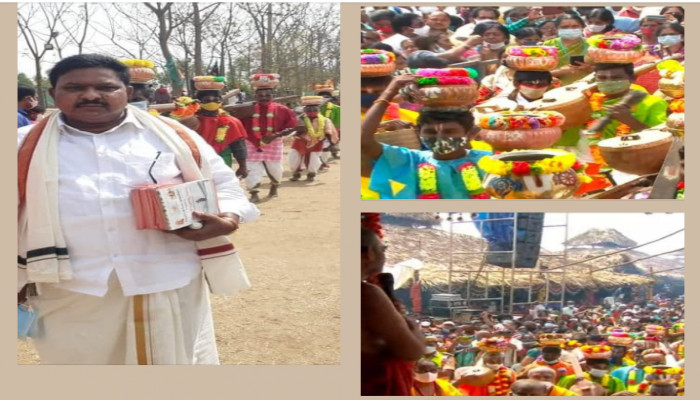Haridasulu: Defenders of Sanatana Dharma
- In Religion
- 11:03 AM, Feb 10, 2022
- Mary Suresh Iyer
I am thrilled to see Haridasulu being given such warm reception by Chinna Jeeyar Swami as part of the inagural ceremonies of statue of Ramanujacharya in Hyderabad. Many thanks to Vishnuvu Talluri garu, the president of Samarasata Sewa Foundation who organized the gathering of Haridasulu at the inaugural site. Vishnuvu Garu's dedication in helping these people in every way possible is the greatest of the Sewa one can offer to Maa Bharat. These Haridasulu, the traveling saints like Jangamulu of Veera Shaiva sampradaya, have been pushed to the edges of the society.
Some of these traveling saints have been branded as criminals because of their nomadic life styles that threatend the British Raj. These traveling saints needed to be curbed by British as the saints had an informal network of communication to quickly pass on information about the raids planned by the British police and Criminal Tribes Act was passed into a law that plunged many into the darkest dungeons. With a stroke of a pen, many of these communities went from the status of traveling saints to criminals by birth.
To understand the role played by Haridasulu in defending Sanatana Dharma, we need delve into the history of Bharat between 6th-10th century when the land of Bharat saw an unparalleled spiritual uprising due to Bhakti movement.
Bhakti movement was an important landmark in the cultural history of medieval India that brought in a silent revolution in society bringing many much needed socio-religious reforms.
In Southern India, Bhakti movement that was based on the principles of religious equality emerged as a religious doctrine. This movement was initiated by the Saiva Nayanar saints and Vaisnava Alvar saints and rapidly spread among different sections of the society irrespective of caste and sex. The saint-poets preached Bhakti in an intense emotional manner to promote religious egalitarianism. Unlike the popular belief that Bhakti movement spear headed a fight against Brahmins to purge Hindu society of Brahmins and their orthodoxy, Bhakti movement launched a head-on fight against Jains and Buddhists who enjoyed a privileged status at the courts of South Indian monarchs during that period. Bhakti saints disregarded the austerities preached by the Jains and the Buddhists and preached personal devotion to God as the means of salvation.
Haridasu tradition that is popularly associated with Sankranti celebrations is believed to have begun as part of Bhakti movement in Telugu speaking communities. While Jangamulu/ Jangamas are monks from Shaiva order, Haridasulu are the Vaishnava devotees who proudly identify themselves as the Daasulu (servants) of the very Hari (Vishnu). Hari Dasulu also played a significant role in countering the onslaught of Jainism and Buddhism and they did this by reminding people about glory of Shri Maha Vishnu.
Just like Jangamulu have their own unique guru sampradya that is rooted in Veera Shaiva traditions, Haridaasulu also have a guru Sampradaya headed by Vaishnava gurus. A group of Haridasulu learn from a Guru and are part of a guild. A guru who acts as a head of this guild allocates an area consisting of a group of villages and localities to each of the Haridasu.
Neither the Jangamulu nor the Haridasas were beggars. A Haridaasu never stops to ask for alms or charity. He does not look back, even if there is any kind of danger behind. In fact, he does not speak at all, only sings eulogies of the lord. It is only when he is hailed, does he stop.
In the rural areas, people respectfully wash his feet, pay their obeisance and seek his blessings. He bends down to allow access to the Akshaya Patra on his head in which people put rice or money.
Even to this day, at the end of the Dhanur Masam, the Haridasulu congregate at Bhadrachalam where all the collections are pooled together and annadanam or free meals for devotees at the temple is organised. As long as they are in this avatar, they eat only once a day in the night.
Contrary to the popular belief that haridasulu are beggars, they are devoted to a unique cause, a cause to revive the name of the lord and remind the layman of the grace of the Almighty. Along with the name of the lord, they also remind one and all to share and donate at least a handful of grains with other.
Image provided by the author.
Disclaimer: The opinions expressed within this article are the personal opinions of the author. MyIndMakers is not responsible for the accuracy, completeness, suitability, or validity of any information on this article. All information is provided on an as-is basis. The information, facts or opinions appearing in the article do not reflect the views of MyindMakers and it does not assume any responsibility or liability for the same.







Comments